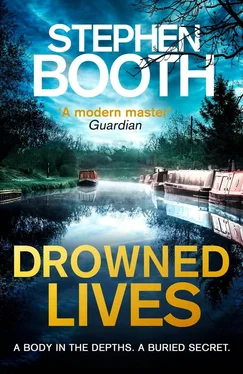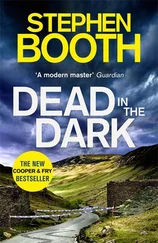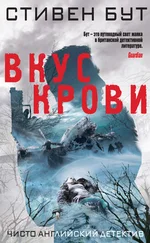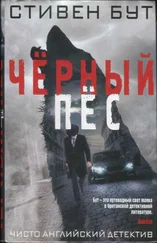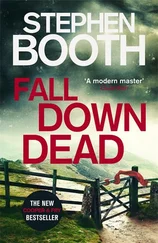Within a few more yards we’d passed out of Hopwas altogether into a rural stretch of canal, where the silence around us was palpable. The River Tame ran close to the canal, and woods rose to the west. According to a sign, this was the furthest reach of the firing range at Whittington Barracks. Another danger area.
Two swans with tags on their legs followed the boat under the next bridge. They eyed us malevolently and hissed at us quietly through orange beaks. The arch of the bridge was low, and sunlight reflected off the water onto its lichen-covered bricks. Past the bridge, the trees were different. They had rough bark, and their branches divided low on their trunks to reach out across the water. The passage of the boat set up slow ripples that spread out behind us and nudged the banks, stirring the weeds and disturbing a moorhen. A cool breeze sprang up on the open section of canal. Petals slipped from the wreaths and drifted onto the water like confetti.
The journey to Whittington took about forty-five minutes. As soon as the novelty of the boat had begun to wear off, I was able to study the other mourners closely. No doubt they studied me too. From a galley near the stem of the boat, a woman in an apron served us with cups of tea and biscuits, and the atmosphere became more relaxed, as it does on these occasions when refreshments arrive. The people sitting near me began to eye me curiously.
‘So how did you know the Captain?’ said the man with the cap, after the tea had done its job.
‘I’m a relative.’
‘Oh?’
They looked at each other, but carefully avoided looking at Caroline’s party.
‘His great-nephew.’
‘I see. Were you close?’
‘No, we hadn’t seen each other until recently.’
‘He was a grand chap,’ said one of the women, her hat swaying as she nodded.
‘The best,’ said the other. ‘No edge to him at all. He always had a friendly word for everyone he met. And he must have met plenty of people in his time.’
‘Everyone knew the Captain.’
Now I had them placed. They were boaters, Samuel’s fellow waterways enthusiasts, turning out to pay their respects. They introduced themselves as Eric and Barbara, Malcolm and Margaret.
‘A few years ago the Captain was up and down this bit of canal all the time,’ said Eric. ‘He went everywhere. Braunston, onto the Oxford, down to the Trent and Mersey and the Grand Union.’
‘There were still working boats on those canals until the late 1960s, maybe a bit later,’ I said.
‘He liked that.’ Eric smiled at me. ‘The Captain was a pleasure boater himself, of course. But he was disappointed when the working boats stopped. Of course, trade just died out. They couldn’t compete any more.’
‘Sometimes he had the girl with him too,’ said Barbara.
We all looked towards Caroline. She wasn’t a girl any more. She looked mature and calm, and very much in control. The black suited her — it gave her an air of elegance and sophistication that made her stand out from those around her.
‘Ah, but he hadn’t been boating for a while.’
‘A few years, certainly.’
‘What made him stop?’ I asked.
‘Don’t know.’
‘Old age probably.’
‘But he kept up his interest in the waterways.’
‘Oh, he put a lot of money into them.’
‘Yes, you could always count on him when it was needed.’
Their eyes turned on me again, openly speculative now. ‘He had plenty of money, didn’t he? The Captain?’ one said.
I managed a non-committal shrug.
‘I suppose it goes to the girl,’ said Eric, studying the back of Caroline’s head as she delicately chewed on a biscuit.
‘I believe so,’ I said. ‘Most of it, anyway.’
They watched me, waiting for me to continue. A residue of funeral decorum held them back from interrogating me about my relationship to the rest of the family and exactly how much I was going to gain from Samuel Longden’s will.
‘Do you recognise any of the other people here?’ I asked. ‘Apart from Caroline.’
Eric indicated discreetly with the peak of his cap. ‘Those two in the corner. Their name’s Chaplin.’
‘Frank and Sally,’ said Barbara. ‘I was speaking to them earlier on.’
‘Some sort of relatives, aren’t they?’
‘He’s Caroline’s half-brother.’
‘Ah, he’d be the son of Samuel’s wife from her first marriage,’ said Eric.
‘She died, you know. In a car crash,’ Margaret told me in a hushed voice.
‘What about Caroline’s companion?’
‘I think he’s her boyfriend,’ said Eric doubtfully.
‘It’s Simon something,’ said Malcolm. ‘I heard her call him Simon.’
‘Do you know his last name?’
Margaret moved across the aisle and held a whispered conversation with another couple. ‘His name’s Simon Monks,’ she said when she came back. ‘And he’s not her boyfriend, he’s her fiancé. They’re getting married.’
We passed a farm and a scatter of buildings. A pair of carriages rattled by on the railway line from Lichfield to Tamworth as we approached the level crossing at Hademore. The canal took a swing to the west, following the contours of the land towards the rifle ranges on the heath, and running alongside the road as far as Whittington Bridge.
From here, although there was no obvious change in the waterway, I knew it reverted to the Coventry Canal from the stretch of Birmingham and Fazeley we’d been on. This was the detached portion of the Coventry, an anomaly left by a dispute between rival companies that had rumbled on for years.
‘Not far now,’ said one of the canal people.
Cups and plates were being cleared away. Visits were made to the toilets somewhere ahead of the galley. Gradually, the party remembered what it was assembled for. Some of us had forgotten what was carried on the roof, until we passed the sewage works and chugged along close to the houses in Whittington. People came out of their back doors to watch us, and an old man walking his dog on the towpath shouted to the steerer to ask whose funeral it was.
Word seemed to spread through the village. By the time we tied up at the moorings near Burton Road, there was a crowd on the roadside, almost blocking the traffic. They stood in the garden of a pub, right among the play equipment and a grotesque plastic tree with a twisted human face like something out of Tolkien’s Lord of the Rings . Next to the pub was a pair of old lock gates set into the ground and a sign that said ‘Whittington Lock’. But there had never been any locks on the Coventry Canal, so these gates had come from somewhere else.
Whittington Wharf was just below the bridge. It was only a private house really, with a shed in the garden labelled ‘site office’. But there was a landing place where space had been left for the funeral boat to tie up.
We waited while the men carefully lifted the coffin from the roof. The boat rocked in the water when it was relieved of the weight. They carried the coffin up the path to the road, where the hearse waited, then came back for the flowers as we all disembarked via the gangplank, smoothing our clothes self-consciously and casting our eyes down under the barrage of curious stares from the bridge. A policeman was on duty to halt the traffic and allow the hearse and funeral cars to move off. I found myself crammed into the second black limousine with the Chaplins and an unidentified old lady who’d spoken to no one.
Frank Chaplin was a narrow-shouldered man in his forties with curly ginger hair starting to recede from his forehead. He had a wispy moustache and a tendency to smile without showing his teeth, which made him look as though he was smirking. Every few minutes he shot back the over-long cuff of his black suit to look at his wristwatch. His wife Sally was dark-haired, with a generously built body restrained in a tight grey skirt and jacket.
Читать дальше
